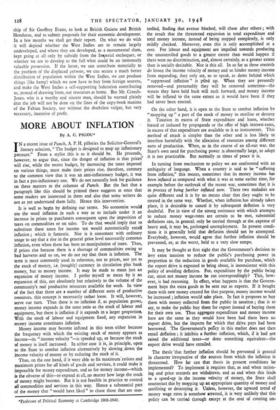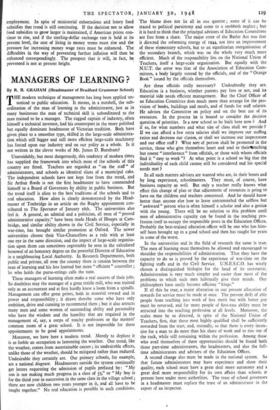MORE ABOUT INFLATION
By A. C. PIGOU*
IN a recent issue of Punch, A. P. H. pillories the Solicitor-General's literary solecism, " The budget is designed to mop up inflationary pressure." From a stylist this is as it should be. He proceeds,. however, to argue that, since the danger of inflation is that price? will rise, while the recent budget, by increasing the taxes imposed on various things, must make their prices rise, therefore, contrary to the common view that it was an anti-inflationary budget, it was in fact a pro-inflationary one. We do not naturally look for guidance on these matters to the columns of Punch. But the fact that a paragraph like this should be printed there suggests at once that some readers are interested in them and also that some writers do not as yet understand them fully. Hence this intervention.
It is well to begin by defining our terms. No economist would use the word inflation in such a way as to include under it an increase in prices to purchasers consequent upon the imposition of taxes on commodities or on sales. To do that would imply that to substitute these taxes for income tax would automatically entail inflation ; which is fantastic. Nor is it consonant with ordinary usage to say that a rise in the general price level necessarily connotes inflation, even when there has been no manipulation of taxes. Thus, if prices rise because there is a shortage of commodities owing to bad harvests and so on, we do not say that there is inflation. The term is most commonly used in reference, not to prices, nor yet to the stock of money, i.e. (roughly) currency in circulation plus bank money, but to money income. It may be made to mean just an expansion of money income. I prefer myself to mean by it an expansion of this, not absolutely but relatively to the volume of the community's real productive resources available for work. In view of the fact that there are a number of different sorts of productive resources, this concept is necessarily rather loose. It will, however, serve our turn. Thus there is no inflation if, as population grows, money income expands in the same ratio as the stock of labour and equipment, but there is inflation if it expands in a larger proportion. With the stock of labour and equipment fixed, any expansion in money income constitutes inflation.
Money income may become inflated in this term either because the frequency with which the existing stock of money appears as income—its "income velocity "—is speeded up, or because the stock of money is itself increased. In either case it is, in principle, open to the State to combat inflation alternatively by slowing. down the income velocity of money or by reducing the stock of it.
Thus, on the one hand, if it were able to fix maximum-rations and maximum prices for all kinds of goods and services, it could make it impossible for money expenditure, and so for money income—which is the obverse of this—to expand at all, no matter how large the stock of money might become. But it is not feasible in practice to control all commodities and services in this way. Hence a substantial part of the money that " would have liked " to chase those that are con-
*Professor of Political Economy at Cambridge 1908-1943. trolled, finding that avenue blocked, will chase after others ; with the result that the threatened expansion in total expenditure and total money income, instead of being stopped completely, is only mildly checked. Moreover, even this is only accomplished at a cost. For labour and equipmen: are impelled towards producing the uncontrolled goods to a greater extent than would happen if there were no discrimination, and, almost certainly, to a greater extent than is socially desirable. Nor is this all. In so far as these controls do lessen the income velocity of money and so hinder money income from expanding, they only act, so to speak, as dams behind which " suppressed inflation " is piled up. When they are presently removed—and presumably they will be removed sometime—the waters they have held back will rush forward, and money income will be inflated to the same extent as it would have been if they had never been erected.
On the other hand, it is open to the State to combat inflation by " mopping up " a part of the stock of money to sterilise or destroy it. Taxation in excess of State expenditure and loans, whether forced or induced by propaganda or the offer of high interest-rates, in excess of that expenditure are available to it as instruments. This method of attack is simpler than the other and is less likely to interfere harmfully with the allocation of resources among different sorts of production. When, as in the course of an all-out war, the State's own need for purchasing power is abnormally large, to adopt it is not practicable. But normally in times of peace it is.
In turning from mechanism to policy we are confronted with an ambiguity of language. When a country is said to be " suffering from inflation," this means, sometimes that its money income has been inflated as compared with what it was at some earlier time, for example before the outbreak of the recent war, sometimes that it is in process of being further inflated now. These two maladies are quite different and it is by no means clear that they ought to be treated in the same way. Whether, when inflation has already taken place, it is desirable to cancel it by subsequent deflation is very doubtful. For in view of the strong resistance with which attempts to reduce money wage-rates are certain to be met, substantial deflations can, in general, only be carried through at the_ expense of heavy and, it may be, prolonged unemployment. In present condi- tions it is generally held that deflation should not be attempted. Everybody, however, would agree that further inflation should be prevented, or, at the worst, held to a very slow tempo.
It may be thought at first sight that the Government's decision to levy extra taxation to reduce the public's purchasing power in proportion to the reduction in goods available for purchase, which the export drive is expected to bring about, is inconsistent with this policy of avoiding deflation. For, expenditure by the public being cut, must not money income be cut correspondingly? This, how- ever, is bad reasoning. In effect, what happens is that the Govern- ment buys the extra goods to be sent out as exports. If it bought them with new money created for that purpose, money income would be increased ; inflation would take place. In fact it proposes to buy them with money collected from the public in taxation ; that is to say, to make the public buy them for export instead of buying them for their own use. Thus aggregate expenditure and money income here are the same as they would have been had there been no export drive, but the imports for which that drive pays had been borrowed. The Government's policy in this matter does not then entail deflation ; it inhibits a further inflation, which, if it had not raised the additional taxes—or done something equivalent—the export drive would have entailed.
The thesis'that further inflation should be prevented is general in character irrespective of the sources from which the inflation is threatened. How far can that thesis in present conditions be implemented? To implement it requires that, as and when ration- ing and price controls are withdrawn, and as and when this leads to a speed-up in the income velocity of money, the State shall counteract this by mopping up an appropriate quantity of money and sterilising or destroying it. Unless, however, the upward trend of money wage rates is somehow arrested, it is very unlikely that this policy can be carried through except at the cost of creating un-
employment. In spite of ministerial exhortations and heavy food subsidies that trend is still continuing. If the decision not to allow food subsidies to grow larger is maintained, if American prices con- tinue to rise, and if the sterling-dollar exchange rate is held at its present level, the cost of living in money terms must rise and the pressure for increasing money wage rates must be enhanced. The difficulties itt the way of preventing further inflation will then be enhanced correspondingly. The prospect that it will, in fact, be prevented is not at present bright.



































 Previous page
Previous page